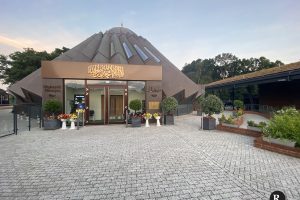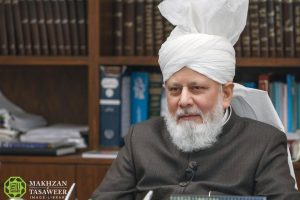As readers of the Review of Religions will be aware, the Ahmadiyya Community is celebrating one hundred years of the blessed institution of Khalifat. Ahmadis in countries around the world are additionally marking this occasion at their annual conventions.
In this edition we include the two addresses delivered by Hadhrat Khalifatul Masih V, Head of the worldwide Ahmadiyya Muslim community, at the Nigerian annual. In a speech given at the occasion of the London Annual Convention, ‘The importance of the Institution of Khlilafat for the modern age, our attention is drawn to the Darood prayer (invoking blessings of Allah upon Muhammad(saw) and Abraham(as) and their followers) recited by Muslims several times a day for the prosperity and blessings for the people of Muhammad(saw) in the same manner as the people of Abraham(as) were blessed. What were those blessings? Abraham’s progeny numbered prophets, khalilfas and kings – eg Noah, Moses, David, Solomon and Jesus (peace be upon them all). Therefore this article makes the pertinent point that both prophethood and khilafat had been promised to the Muslims whether or not they realise it.
In this context the following dream of the Promised Messiah(as) is of interest:
In January 1907 the Promised Messiah(as) had a dream in which he saw two men standing either side of Hadhrat Mirza Sharif Ahmad Sahib (the grandfather of the current Khalifa, Hadhrat Khalifatul Masih V). In the dream, Hadhrat Mirza Sharif Ahmad Sahib was wearing a turban (a sign of rank). One of the men pointed at him saying “the king has come” and the other said “he still has to become a judge (qadhi)”
The Promised Messiah(as) interpreted the dream as follows. He writes that a qadhi is also a ‘hakam’, meaning ‘one who rules under the principles of justice.’ A ‘qadhi’ is also one who is an arbiter and upholds the truth and eradicates evil. A possible meaning of this dream, therefore, is that it will be from the progeny of Hadhrat Mirza Sharif Ahmad Sahib that there will be those who will combine the roles of rulers, judges and spiritual kings.
Hadhart Mirza Masroor Ahmad Sahib is the grandson of Hadhrat Mirza Sharif Ahmad Sahib and the first person from his progeny to wear the turban as Khalifatul Masih.
The hallmark of khilafat is unity – unity of all believers under a single spiritual guide that is the living Khalifa. However it is a unity that encompasses diversity. In his speech in Nigeria, Hadhrat Khalifatul Masih V draws our attention to this. He emphasises the importance of fidelity and pride in one’s nation and states that by following the teachings of Islam in their pristine form and by being honest one brings honour to one’s nation. This is an important message for those who try to create discord amongst Muslims. Indeed it is only the institution of khilafat that allows one to maintain national and individual identity and also have a framework for communal progress that transcends tribal, national and racial divisions. This indeed is the blessing that has been accorded to all Muslims if only they allow themselves to realise it.
References
(Tadhkirah –Urdu 1969 p. 691 no. 1277)




Add Comment